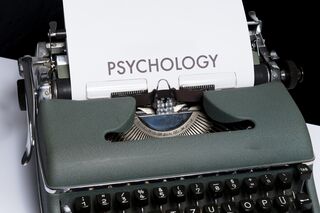Relationships
Why Psy? The Benefits of Studying Psychology
A psychology course may fill a prerequisite, improve relationships, and more.
Posted May 22, 2021 Reviewed by Lybi Ma

When I write about the reality of psychology and psychology-related degrees, I receive emails from students all over the world asking for guidance. Should they pursue a psychology degree? Should they go a different direction? Will they succeed? Help!
Given the anxiety these realities can cause, I thought I’d share some simple reasons to go for it when it comes to studying psychology. Whether it’s a degree or a few classes, psychology has countless benefits.
Why Psy? For school!
I can’t tell you how many students email me every semester, desperate to get into my closed courses because they neeeed a psychology course before they can start graduate school (as a prerequisite). Similarly, nursing students flood my courses, as they are required to take several psychology courses.

Psychology is a requirement for many degree programs, so even if you’re not required to take it in undergrad, you might be required to make up for not having taken it before graduate school. The more you know about and can complete requirements now, the less time you’ll spend catching up on prerequisites when you really want to start that graduate program.
When I worked with pediatric residents and medical students at UC San Diego, we often talked about their educational backgrounds. Sure, several were biology majors, as expected, but a number were psychology majors or double-majors. The reason? “It helped me get into med school.”
Having a degree, or any level of education, that indicates understanding people is very helpful for people-focused professions. That’s why nursing students are required to take it. Many graduate programs look favorably at candidates with psychology education, even some you might not expect. In fact, when it comes to medical school, residents with psychology (and related) backgrounds often told me, “Everyone had a biology degree. That’s boring. I got in because I was different. It helped.”
Why Psy? For Work
John Holland called professions like nursing and counseling “social professions.” These professions, in which you interact with people, benefit from the study of the human mind and behavior. Not only does it help you get into school, but it also helps you perform better. We’ve all had those doctors with absolutely no bedside manner. If those doctors took psychology, they weren’t paying attention (or didn’t care).

I used to get upset on behalf of my students from other countries who were practicing doctors made to repeat medical school here. Many of them took my psychology classes as prerequisites for U.S. medical education. While I still cannot imagine having to complete medical school twice, I do understand why many of them, who had never taken psychology, were required to do so.
Beyond medical professions and those we typically think of, like counseling and social work, psychology helps with almost any job. We all have coworkers, we all have to learn, many of us interact with the humans in some form… even when we’re not in “social professions.” Psychology covers a surprising number of topics, all of which apply to almost any type of employment. Personally, I think the most relevant, applicable lesson psychology teaches is how to understand others’ behavior; an understanding that often results in the life-changing realization, “Oh, that’s about them, not me.”
Why Psy? For Life
Many first-time psychology students enter class assuming they are going to learn how to diagnose people. Instead, they quickly find out that psychology is a lot more than that (and that psychology students are not qualified to diagnose people). Most fundamentally, psychology is a science. Students learn how to evaluate data, information, and claims. They learn how to think critically. I like to call it “critical consumption.” We get so many messages and so much information thrown at us daily; psychology helps us critically consume it all. Critical consumption is a valuable skill not just for daily life, but for school and work as well.

Of course, we can do the “it helps you understand people!” thing here too. Who doesn’t benefit from an understanding of the behaviors of your friends, family, coworkers, neighbors, pets, and self? And you don’t have to be a psychology major with a lot of classes under your belt to benefit from this knowledge; just ask the students in the introductory-level personality psychology course who discovered narcissism and wouldn’t let me change topics.
Try Psy
In my experience, very few students dislike psychology. Sure, some are disappointed with the salaries psychology-related jobs offer, some don’t like having long-held beliefs challenged, but all benefit from learning it. My advice? Try psychology. An introductory psychology course may fill a prerequisite you don’t yet know is in your future, improve your relationships, help you train your pet, you name it. It just might change your life.




